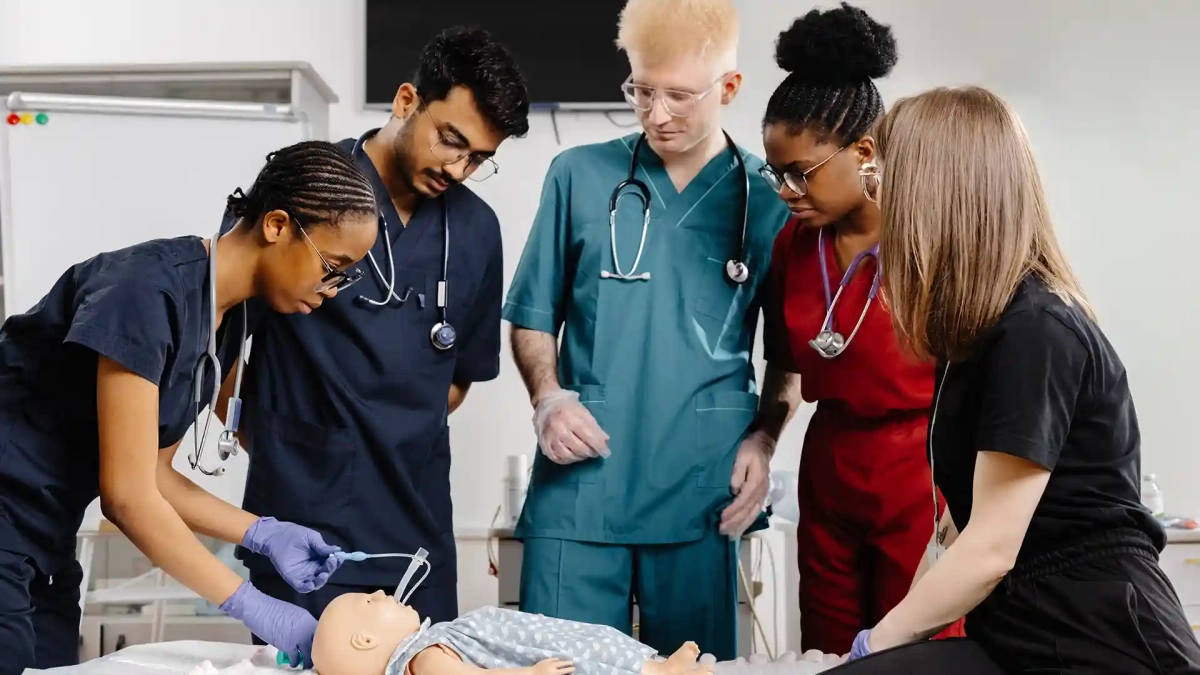How to Apply for Nursing Ausbildung in Germany: Step-by-Step Guide for International Applicants
- How to Apply for Nursing Ausbildung in Germany: Step-by-Step Guide for International Applicants
- What Is Nursing Ausbildung in Germany?
- Eligibility Requirements for Nursing Vocational Training
- How to Apply for Nursing Ausbildung in Germany: Step-by-Step
- Visa Process for Nursing Vocational Training in Germany
- Salary During Nursing Ausbildung
- After Completing the Ausbildung: Career Prospects and Residence Permit
- Tips to Improve Your Chances
- When to Apply for Nursing Ausbildung?
- Summary: How to Apply for Nursing Ausbildung in Germany
How to Apply for Nursing Ausbildung in Germany is a key search for many international students and job seekers looking to build a stable career in Europe. Germany is currently facing a critical shortage of qualified nurses. To address this, the country actively welcomes applicants from outside the EU—especially those ready to train through its vocational system.
The process to start your career in German healthcare is well-defined and accessible. You begin by confirming that your high school diploma is recognized. Then, you need to reach a B2 level in German. Once eligible, you can apply directly to hospitals, elderly care homes, or vocational nursing schools. If selected, you’ll receive a training contract, which is required to apply for the Ausbildung visa.
Applying for nursing Ausbildung in Germany is a structured but realistic path, even if you have no prior work experience in healthcare. This guide explains every step in detail—requirements, documents, salary, visa process, and what happens after you complete the training. Whether you’re from India, the Philippines, Africa, or anywhere else, this article gives you a clear, updated roadmap to get started.
How to apply for nursing Ausbildung in Germany doesn’t need to be confusing. With the right preparation and guidance, you can join one of Europe’s most respected healthcare systems and secure long-term employment.
What Is Nursing Ausbildung in Germany?
Nursing Ausbildung, formally known as Pflegefachfrau/Pflegefachmann Ausbildung, is a government-recognized vocational training program that prepares you to work as a qualified nurse in Germany. It is part of Germany’s dual vocational training system (duale Ausbildung) and combines:
- Theoretical training at a vocational school (Berufsschule or Pflegeschule)
- Practical training in hospitals, nursing homes, or outpatient care centers
Duration: 3 years (full-time)
Upon completion, trainees earn the protected title Pflegefachfrau (female nurse) or Pflegefachmann (male nurse) and are eligible to work across all EU countries without needing requalification.
Eligibility Requirements for Nursing Vocational Training
Before applying, make sure you meet the following basic eligibility criteria:
Educational Qualifications
- Minimum: Higher secondary school certificate (Class 12)
- If applying from outside the EU, your diploma must be recognized as equivalent to German standards. Use the ANABIN database or submit it through the ZAB (Zentralstelle für ausländisches Bildungswesen) for recognition.
Language Proficiency
- German language level B2 is mandatory.
- You must pass a certified exam such as Telc B2, Goethe B2, or ÖSD B2.
- Some training providers may allow entry at B1 with the condition of reaching B2 within the first year.
Age
- There is no upper age limit, but most candidates are between 18 and 35.
- You must be at least 17 years old to apply.
Health and Background Check
- A medical fitness certificate and police clearance certificate (no criminal record) are required.
How to Apply for Nursing Ausbildung in Germany: Step-by-Step
This step-by-step guide explains how to apply for nursing Ausbildung in Germany as an international applicant. Each stage is essential for building a successful application and securing your place in a recognized nursing program.
Step 1: Prepare Your Documents
Before applying, collect all required documents. They must be in German or officially translated into German.
Required Documents:
- School-leaving certificate (with proof of recognition or equivalency)
- Valid passport
- German-style CV (preferably in Europass format)
- Motivation letter in German
- German language certificate (minimum B1, ideally B2)
- Recommendation letters (optional but helpful)
- Any proof of volunteering or prior healthcare experience
Make sure your educational credentials are recognized. Use the ANABIN database or submit them for evaluation to the ZAB (Central Office for Foreign Education) if required.
Step 2: Search for Open Ausbildung Nursing Positions
Look for open nursing Ausbildung programs using trusted German platforms and training providers.
Where to Search:
- Bundesagentur für Arbeit (Jobbörse)
- Ausbildung.de
- Pflegeausbildung.net
- Official hospital websites (e.g., Charité, Asklepios, Helios, Diakonie)
- Private nursing schools and vocational training centers
Keywords to Use in Your Search:
- Pflegefachfrau Ausbildung
- Pflegefachmann Ausbildung
- Ausbildungsplatz Pflege
Tip: Apply to both hospitals and elderly care homes to increase your chances.
Step 3: Apply Directly to Training Providers
Send your application directly to the hospitals, care facilities, or nursing schools offering Ausbildung programs.
Application Methods:
- Online application forms (common for larger hospitals and schools)
- Email application with attached documents
- Postal submission (for traditional or smaller institutions)
Each provider may have its own deadline, so check carefully and follow the instructions in each listing.
Step 4: Attend the Interview (Online or In Person)
Shortlisted applicants will be invited for an interview. If you’re applying from abroad, the interview may be held online.
What to Expect in the Interview:
- Questions about your motivation to become a nurse
- Discussion on your understanding of the profession
- Long-term goals and plans in Germany
- Verbal German language assessment (to check if your B2 level is authentic)
Prepare thoughtful and honest answers, and be ready to explain your interest in the German healthcare system.
Step 5: Sign the Training Contract (Ausbildungsvertrag)
If accepted, you’ll receive a formal Ausbildungsvertrag (training contract), which is required for your visa application.
Key Elements Your Contract Should Include:
- Duration of training (usually 3 years)
- Locations of practical and theoretical training
- Monthly salary or stipend (Ausbildungsvergütung)
- Working hours, vacation days, and other employment terms
Once signed, this contract becomes the legal basis for your Ausbildung visa application and the foundation of your nursing career in Germany.
Visa Process for Nursing Vocational Training in Germany
If you are a non-EU applicant, you must apply for a German national visa (D visa) under the Ausbildung visa category to begin your nursing vocational training (Pflegeausbildung). This visa allows you to legally enter and stay in Germany for the full duration of your Ausbildung, which usually lasts three years.
Who Needs an Ausbildung Visa?
Applicants from non-EU or non-EEA countries who have secured an Ausbildungsvertrag (training contract) but are not yet residing in Germany are required to apply for this visa. EU/EEA and Swiss citizens do not need a visa but must register their residence after arrival.
Key Visa Requirements for Nursing Ausbildung in Germany
To apply for the visa, you must gather a complete set of documents and meet the following criteria:
- A valid Ausbildungsvertrag (training contract) signed by a German employer or nursing school
- A recognized school-leaving certificate, equivalent to the German Realschulabschluss or higher
- A German language certificate, usually at least B2 level, issued by Telc, Goethe-Institut, ÖSD, or ECL
- Proof of financial resources, such as:
- A blocked account (Sperrkonto) showing approximately €934 per month, or
- Confirmation of salary from your training provider (Ausbildungsvergütung)
- Valid health insurance coverage for Germany (private or public accepted for visa purposes)
- Proof of accommodation in Germany, or temporary housing confirmation (e.g. hotel or hostel booking)
- A motivation letter explaining your intent and future goals
- A curriculum vitae (CV) in German
- Visa application forms, filled and signed
- Valid passport with at least 12 months remaining before expiration
- Passport-size biometric photos, as per German embassy standards
- Police clearance certificate (from your home country), showing no criminal record
Where to Apply
You must apply at the German embassy or consulate in your home country or country of legal residence. Check their official website for specific requirements, appointment booking, and application submission methods.
Some embassies accept online applications and appointment bookings, while others may require in-person submission or courier delivery of documents.
Visa Processing Time
- Standard processing time: 6 to 12 weeks
- In high-demand seasons or countries with high volumes, it may take longer
- Apply at least 3 months in advance of your training start date
If your application is incomplete or any documents are missing, the process may be delayed or rejected. Always ensure every form is accurate, signed, and submitted with certified translations where necessary.
After Arrival in Germany
Once your visa is approved and you arrive in Germany:
- Register your address at the Einwohnermeldeamt (local registration office) within 14 days
- Convert your visa into a residence permit for vocational training (Aufenthaltserlaubnis zur Berufsausbildung) at the local Ausländerbehörde (foreigners’ office)
- Submit your health insurance policy, training contract, and proof of address for this process
The residence permit is typically granted for the full duration of your Ausbildung (up to 3 years) and can later be extended or converted to a work permit after completion.
Salary During Nursing Ausbildung
Trainees receive a monthly training allowance (Ausbildungsvergütung) as regulated by collective agreements.
Approximate Net Monthly Pay:
- Year 1: €1,190 – €1,250
- Year 2: €1,250 – €1,320
- Year 3: €1,350 – €1,500
The salary is enough to cover basic living expenses in most German cities. Health insurance and pension contributions are already deducted.
After Completing the Ausbildung: Career Prospects and Residence Permit
After finishing the program, graduates can:
- Work as a registered nurse in hospitals, elderly care centers, or outpatient clinics
- Apply for a residence permit to work in Germany without needing a separate job seeker visa
- Transition to specialized nursing fields such as intensive care, geriatrics, or pediatric nursing
- Earn a net salary of €2,500 to €3,500 per month as an entry-level nurse, depending on region and employer
In addition, after two years of working full-time, you may qualify for a permanent residence permit.
Tips to Improve Your Chances
- Start learning German as early as possible
- Gain volunteer experience in hospitals or care facilities, even in your home country
- Customize each application with a personal motivation letter
- Apply to multiple employers at once to increase your chances
- Consider working with recruitment agencies focused on healthcare placements
When to Apply for Nursing Ausbildung?
Most programs start in March or September. Applications should be sent at least 6 months in advance, especially for non-EU applicants who need a visa.
For example:
- For a September start, apply by February or March
- For a March start, apply by September of the previous year
Summary: How to Apply for Nursing Ausbildung in Germany
- Check if your school certificate is recognized in Germany
- Reach at least B2 level in German
- Prepare all required documents in German
- Apply directly to hospitals, nursing homes, and schools
- Receive and sign the Ausbildung contract
- Apply for a national D visa for vocational training
- Arrive in Germany before your program begins
How informative was this article?
Click on a star to rate it!
We are sorry that this post was not useful for you!
Let us improve this post!
What is missing in the article?















